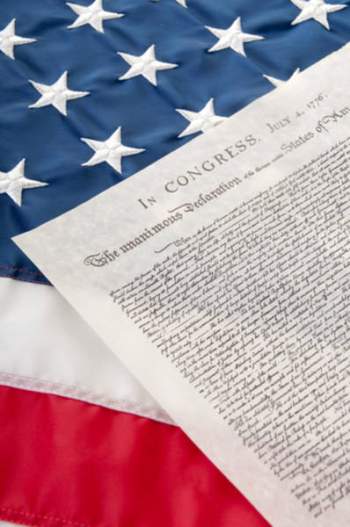
Understanding the 5th Amendment

Popular In Constitution
Purpose Of Lifetime Appointment And Pros And Cons Enumerated Powers Bicameral Legislature Background Article 3 Of The Constitution We The People 1st Amendment Who Wrote The Constitution Judicial Review Equal Protection Clause 5th Amendment 10th Amendment Three Fifths Compromise
The Fifth Amendment of the Bill of Rights is directly related to actual legal proceedings and the protection from any possible abuse by the governmental authority involved in such a proceeding. The Fifth Amendment is one of the most important Amendments found in the United States Constitution, for it provides for several considerations and provisions regarding protecting rights in court or legal procedures.
The 5th Amendment holds that no capital or "infamous crime" is to be held accountable to an individual unless through indictment by a Grand Jury. It provides for an exception, however, regarding cases arising from military forces or the militia during a time of war or extenuating circumstances that require their employment. It states that no person shall be tried for the same offense twice and that a person will not be forced to become a witness against his/her person under the circumstance that such practice could be self-incriminating.
A key and important clause in the Fifth Amendment is that no person shall be convicted without due process of the law. It also includes a provision stating that in the case that private property is to be taken for public use by the Government, compensation is in order and shall be dispensed in a just and fair manner.
The Grand Jury clause under the Fifth Amendment is valuable in the sense that it provides for certain instruction as to how to carry out court proceedings regarding certain crimes. It is important to note that certain Constitutional provisions will not apply to Grand Jury court proceedings. Such examples are the exception of applying the exclusionary rule and defendants not having the right to have their attorneys or lawyers present during a Grand Jury hearing.
Unlike many of the Amendments of the Bill of Rights, the Fifth Amendment has not been subject to implementation by way of enforcing the Fourteenth Amendment. This means that states are free to decide for themselves whether the application of a Grand Jury is necessary. Most states have opted to use preliminary hearings rather than implement a Grand Jury.
The Grand Jury Clause also contains parameters regarding the description of certain types of crimes, such as the word "infamous." It has been decided that infamous crimes are those that may require severe punishment, such as capital punishment. Under the Fifth Amendment, crimes punishable by capital punishment are required to be tried with indictments. Other crimes, such as misdemeanors, may not require indictments in order to be tried by a Grand Jury. This also extends to felonies not punishable by capital punishment, if defendants chose to waive their Fifth Amendment rights.
The concept of Double Jeopardy is also addressed in the Fifth Amendment, which relates to the clause stating "[...]nor shall any person be subject for the same offence to be twice put in jeopardy of life or limb[.]" In other words, once a person is acquitted for a crime, that individual cannot be tried again for the same offense. However, this does not apply in terms of trials carried out by different governments.
The Federal and State Government, under law, are considered to be two different government systems, and thus, it may be possible for an individual to be acquitted at the state level of a crime, but be retried for the same crime at the Federal level.
Self-incrimination is another aspect that protects citizens from being forced or coerced into incriminating themselves when serving as a witness during a court proceeding. This Clause has its history with the use of torture tactics to make witnesses confess to certain crimes. The practice of torture would not only be a violation of human rights and civil rights, but it would also make individuals confess to crimes not committed by them simply to make the agony of torture cease.
In modern applications, the right to silence in court proceedings is granted to prevent an individual from self-incriminating him/herself because of a request to testify. The Fifth Amendment is also included in the Miranda Rights under the Clause "right to remain silent." In certain instances, if an individual is not made aware of these rights, all evidence presented to the courts that was collected during custody can be deemed inadmissible in court. However, in certain cases, such as in cases dealing with Federal income tax, the Fifth Amendment does not apply.



















